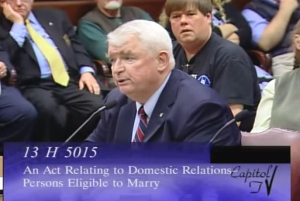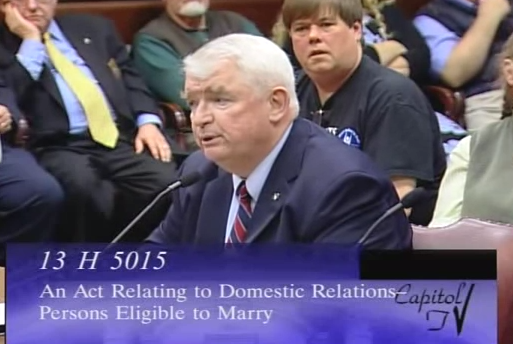 The arc of history is bending towards marriage equality. In a few years, people will look back at opposition to same-sex marriage the same way we look at the racist congressmen who voted against the 13th Amendment in Steven Spielberg’s Lincoln.
The arc of history is bending towards marriage equality. In a few years, people will look back at opposition to same-sex marriage the same way we look at the racist congressmen who voted against the 13th Amendment in Steven Spielberg’s Lincoln.
For real, concrete examples of political regret, we don’t have to look that far back and we don’t have to visit Alabama. We can look at our own state’s recent past, and listen to the words of former state Rep. Charles T. Knowles.
“About twenty years ago I was sitting right where the Chairwoman is, and that year this committee defeated the gay rights bill,” he testified. “I was chairman of the committee, I voted against it and for a period of about three months I was probably one of the most unpopular people in the state of Rhode Island…”
I viewed my opposition basically on moral grounds, as a Christian, but I’ve also said to myself that the First Amendment separates church and state. I believe it goes both ways. The government shouldn’t be putting its nose into my religious beliefs or lack thereof, and I think people’s religion should stay out of this building.
When I was a lawmaker, I should have looked at the law and the Constitution before I made up my mind based on what was in my heart.
At the time Knowles helped defeat the gay rights bill, he said some pretty ignorant things in defense of his views.
I can not extend that support to employment because I feel such an across-the-board extension will establish gays as a constitutionally protected class on a par with race, gender, national origin and other involuntary types of status.
Until we are presented with positive proof that homosexuality and bisexuality are totally involuntary in nature, I choose not to extend the purview of the state’s protection to employment, for fear of creating a Pandora’s box of spurious litigation.
Decades later Knowles’ views have evolved. It is the rare and courageous man who can admit when he is wrong. Charles Knowles is to be commended for delivering this very difficult and emotional public mea culpa.

